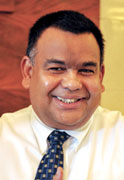Fresh boost for fisheries sector
by Surekha GALAGODA
Banning of indiscriminate fishing methods, launching of the Fishery
Improvement Project (FIP) as well as enforcement of regulations by the
government has helped the fisheries sector to maintain exports.
President Seafood Exporters Association of Sri Lanka, Roshan Fernando
said that banning of indiscriminate fishing methods by the government
has helped to showcase the country as environment friendly at
international forums. The enforcement of regulations such as input
management systems for controlling fishing methods and the control of
catch has given us a boost in the international market, he said.
 |
|
Roshan Fernando |
The Seafood Exporters Association of Sri Lanka in collaboration with
the importers of yellow fin tuna in the UK commenced the Sri Lanka FIP
initiative under the guidance of the Sustainable Fisheries Partnership
(SFP) to enhance management efforts of the Sri Lankan tuna fishery and
ensure sustainability of its resources for the benefit of future
generations. SFP, a non-governmental organisation committed to
maintaining healthy ocean and aquatic ecosystems announced the formal
launch of the Sri Lanka FIP. The Ministry of Fisheries and Aquatic
Resources has expressed support for improvement via regulations such as
banning all forms of trawling, and adopting measures to curb illegal
fishing within its Exclusive Economic Zone (EEZ).
The FIP brings together resources and expertise to support the
Seafood Exporters Association of Sri Lanka in their efforts to meet the
international market sustainability requirements. Sri Lanka is a major
exporter of tuna for European markets. However, some of the Indian Ocean
tuna stocks are declining as a consequence of high fishing pressure.
Companies are working together in the FIP to assure long-term supplies
of tuna and to maintain the health of stocks and ecosystems. This is the
first of several future FIPs on yellow fin and big eye tuna in the
Indian Ocean region that will yield stock level improvements with a
common set of expectations and rules for fisheries and markets alike.
Fernando said that the world is moving towards environment friendly
methods and buyers of sea food are sensitive and eager to ensure that
they are buying fish caught by sustainable fishing methods.
The Good Fish Guide ranks countries as Red,(not to purchase)
Amber(think) and green (can purchase). The fish imported to UK from
countries in the Red List are not purchased while Sri Lanka and the
Maldives are classified under the Amber List. The rest of the Indian
ocean coast countries are classified under the Red List. Therefore we
have an edge over other countries who are competing with us.
Fernando said that our fishermen get Rs. 700 for a kilo of export
grade Tuna and it is the highest price paid by a country within South
Asia and South East Asia regions.
He said that our country has to go for niche products as our fish
production is small. The fishery regulations are adequate to export to
any country while our quality control methods too are very good. He said
that the processing factories in our country are on par with other
countries and labour is highly skilled.
Therefore we can import fish from countries such as New Zealand,
process and re-export.
Fernando who is also Executive Director/CEO Tess Group of Companies
said that about five companies are to start fish canning soon. Tess will
invest Rs. 150m on machinery to start a cannery. “Initially, we will
start with 15,000 cans a day while we have the capacity to increase it
to 50,000 cans per day”, he said. The Metro chain of super markets, a
large chain of super markets in the world with 60 supermarkets in
Germany who are buyers of Tess have agreed to have a mix box of fish on
display at all their super markets. The mix box will consist of eight
kilos of fish in five varieties and the catch is from the North and
East.
Representatives of Metro will be in Sri Lanka next month to support
the fishermen of the North and the East and also get first hand
experience. This is their way of giving back to the community, said
Fernando.
|

